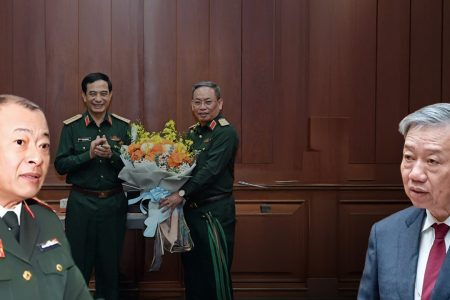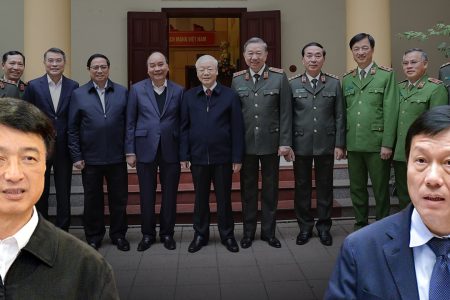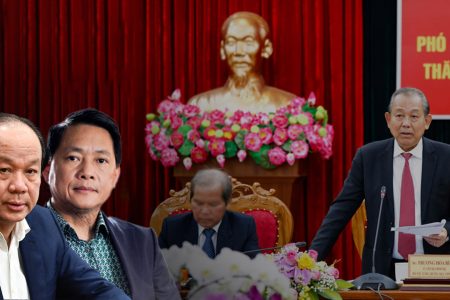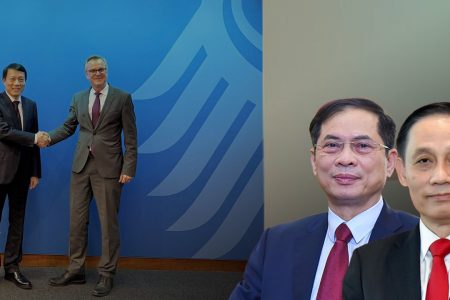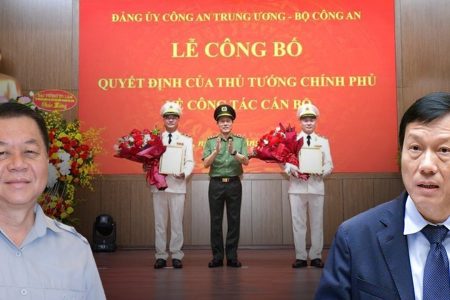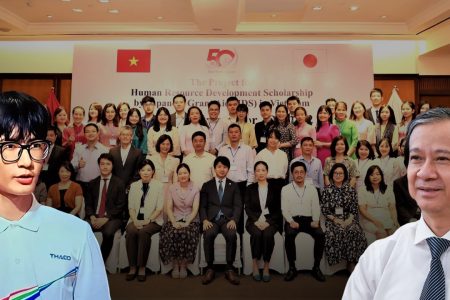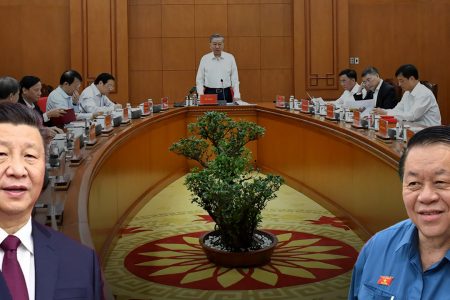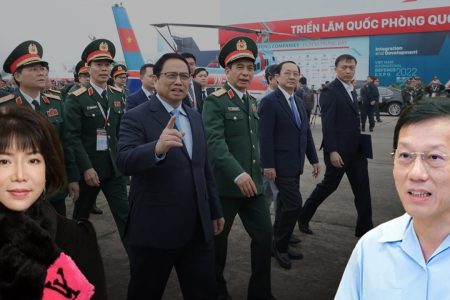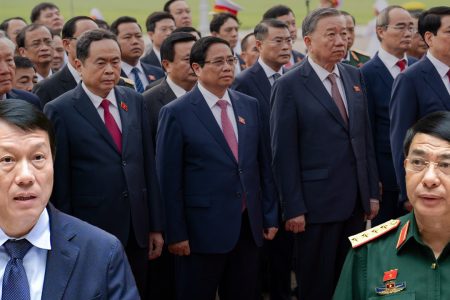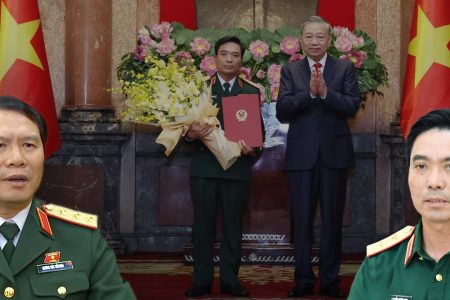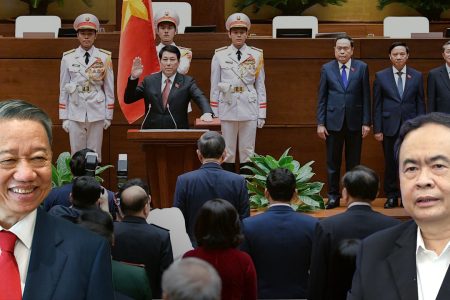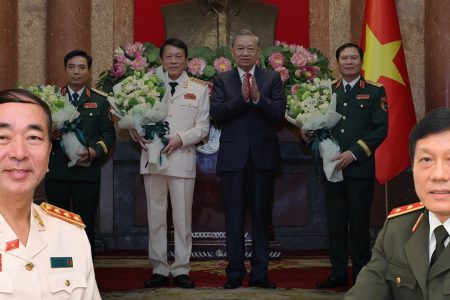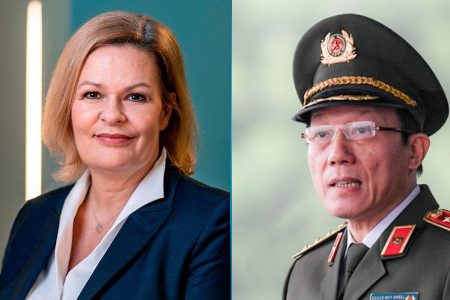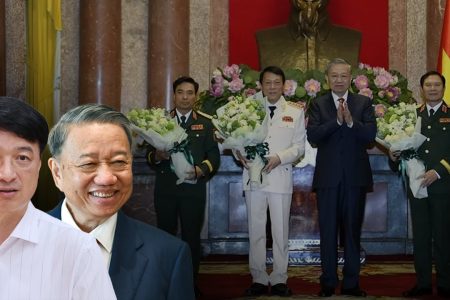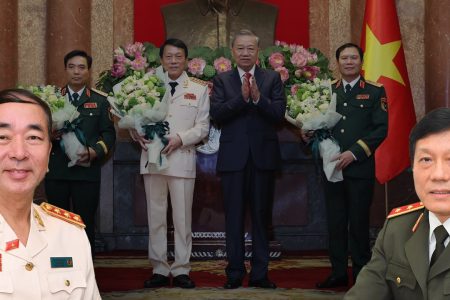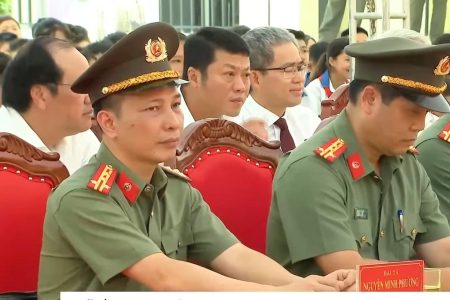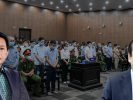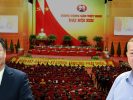
Mr. Nguyen Thanh Nha raised one hand to wave while another was still handcuffed, followed by journalist Truong Chau Huu Danh with the escort of a large number of policemen before entering the courtroom of a court in the Can Tho City.
This is the cover photo of the Vietnam Human Rights Report for the year 2021-2022 that the Vietnam Human Rights Network released on June 24, to describe the reality in Vietnam that the US-based organization says “the state of arrest and imprisonment of those who use freedom of speech to express their opinions has reached its climax.”
In the trial that took place in October 2021, Mr. Truong Chau Huu Danh and four colleagues in the Clean Newspaper group were sentenced to a total of 14 years and 6 months in prison, for only “focusing on corruption reporting” – as statement issued by the US State Department after the trial.
Clean Newspaper group is not an isolated case, according to reports for the period from the beginning of 2021 to May 31 of this year, at least 48 people were arrested and probed and 72 people were convicted with heavy sentences, compared with 46 arrests of the 2021 report.
“Among them, most were convicted of charges related to using the media to express thoughts and aspirations different to those of the ruling party.
Currently, to our knowledge, the Vietnamese communist authorities are holding at least 290 political and religious prisoners with multi-year sentences,” the report states.
Dr. Nguyen Ba Tung, President of the VNHRN, said that the 107-page English-Vietnamese bilingual report shows that the human rights situation in the one-party state has not changed positively, on the contrary, over the past time all worse than before in areas ranging from civil and political rights to socio-cultural-economic rights.
“I would like to give an example on the right to freedom of speech, the government has increased its control and arrested those who use the media to express their opinions and sentenced them to harsher sentences than before.
Among economic, cultural and social rights, such as labor rights, although there is the Labor Law promulgated in 2019, there are provisions on the representative organization of workers at the grassroots, but in reality, up to now, tt’s just an empty promise.
Regarding the right to religious freedom, the government has increased its control and manipulation of religious organizations and eliminated unregistered religious groups.”
On March 31 of this year, the Ministry of Foreign Affairs of Vietnam held a meeting to announce the third cycle of the Universal Periodic Voluntary Review (UPR) Voluntary Report and announce Vietnam’s candidacy for the United Nations Human Rights Council for the 2023-2025 term.
Speaking at the meeting, Mr. Do Hung Viet, Assistant of Minister of Foreign Affairs affirmed that “the midterm report provides a good picture of the seriousness of the Government of Vietnam’s commitment to the UPR process.” and “also shows a good picture of how the human rights of all Vietnamese have improved and where the challenges still lie.”
The Vietnam Human Rights Network, a human rights organization established in 1997, said the above report from Vietnam’s Ministry of Foreign Affairs listed its objectives, promised work, and some amendments. The law has only theoretical value and is not applied in practice.
For example, when it comes to freedom of the press and speech, the Ministry of Foreign Affairs’ report says:
“In Vietnam, journalists and news reporters are protected from all forms of discrimination and violence. It is guaranteed in various laws and regulations.”
However, the sentence against the Clean Newspaper group did not show that, they were banned from practicing journalism for another three years after serving their prison sentence.
The report of the Vietnam Human Rights Network, produced in collaboration with a number of human rights activists in the country and using open source from the press, highlights the increasing violence of the police force, with the records of 13 cases in which suspects were beaten to death or seriously injured.
Meanwhile, before the United Nations, the representative of the Government of Vietnam denied that police violence was the cause of death for the victims while being held in police custody.
The official also said that the victims died because they were seriously ill before they were arrested, or it could be because “the prisoners felt tormented about their crimes so they commit suicide.”
The recently released report of the Vietnam Human Rights Network is a complement to the documents documenting the human rights situation in the Southeast Asian country by international organizations, such as widespread discrimination, including discrimination against people belonging to the Republic of Vietnam regime, discrimination against non-Party people, discrimination against ethnic minorities, discrimination against religious people, and discrimination against women.
Dr. Nguyen Ba Tung added:
“We raised the issue of children being indoctrinated in schools as well as in organizations like Uncle Ho’s Good Children – an issue that has not been raised in any international report on the issue of children’s rights.
Next is the status of discrimination in society, for example, no international research agency mentioned discrimination against non-party people, against individuals and families who had served the Republic of Vietnam regime in the Vietnam War.
Someone raised the fact that military officers must be party members, which violates the basic rights of people in the political sphere and even as a citizen in defending one’s homeland.”
The VNHRN’s report not only wants to alert the world’s public opinion about the human rights situation in Vietnam, but also makes concrete and feasible suggestions for the government to stop the violations that have existed for many years and at the same time claim fair compensation for the damage caused to the victims.
The organization also hopes that democratic governments along with international human rights organizations will have an appropriate attitude towards Vietnam because of its poor human rights record, especially the member states of the United Nations General Assembly should not vote for Vietnam to join the Human Rights Council for the 2023-2025 term.
Before taking this seat, the Vietnamese government must improve its human rights record, strictly enforce international conventions on human rights, and contribute to building a peaceful and prosperous world with the international community, the report states.
Thoibao.de (Translated)



